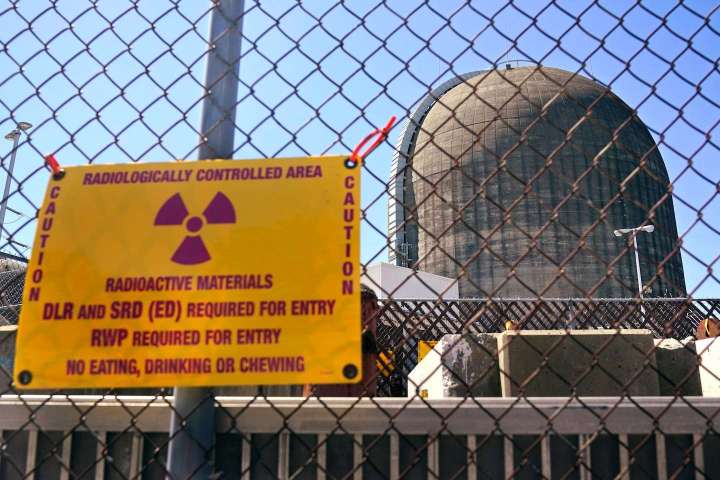Want to make a dirty bomb?
A watchdog lied to get radioactive materials. Terrorists could, too.

The issue is defined in the first line of a new Government Accountability Office (GAO) report: “The Nuclear Regulatory Commission’s (NRC) current system for verifying licenses does not adequately protect against the purchase of high-risk radioactive materials using a fraudulent license.”
The GAO created phony companies and forged documents to purchase the radioactive supplies from U.S. vendors.
Unlike some folks who could do the same thing for nefarious purposes, the investigators “refused to accept shipment at the point of delivery,” the GAO said, “ensuring that the material was safely and securely returned to the sender.”
That’s good to know, but the next set of forgers might not be so civic-minded.
There have been 34 specific instances of sabotage, theft and vandalism of dangerous radioactive materials since 1990, NRC officials told the GAO, according to the office’s latest report on NRC safety. FBI officials had no comment. There were 4,512 nuclear materials events, including lost or stolen radioactive materials, radioactive leaks, and radiation overexposures from 2011 through 2020, according to the NRC.
It takes only one case to cause havoc — there’s not only the immediate potential consequences of death and injury, but also the longer-term socioeconomic effects, including public fear, disruption and decontamination, that the NRC does not sufficiently consider, according to the report.
A statement by the NRC said the commission is working on the issues identified by the GAO, including “immediately communicating with the manufacturers of these radioactive sources to ensure they are vigilant with sales, especially for new customers or unusual activities.” The NRC also is expediting regulations to tighten license verification, “including consideration of multi-factor authentication,” another GAO recommendation.
The GAO acknowledged that the NRC is strengthening its licensing procedures but said “current gaps will remain unaddressed until at least the end of 2023,” in the meantime risking “the exploitation of those vulnerabilities by a bad actor.”
Radioactive materials have numerous beneficial and legal uses in health care, research and industry, but “in the hands of terrorists,” the GAO warned, “even a small amount could be used to construct a radiological dispersal device, also known as a dirty bomb.”
The NRC requires a license to possess radioactive materials, “but the paper licenses it issues can be altered and used to make illicit purchases of radioactive materials,” the GAO found.
The agency’s protections simply are not strong enough. Its “continued reliance on paper-based licensing is problematic,” the GAO said, pointing to a relic of the pre-digital age.
“GAO’s shell companies were successful in acquiring the material because they are not subjected to more stringent controls required for purchases of larger quantities of material,” the report said. “GAO’s investigation demonstrates that the integrity of NRC’s current license verification processes can be compromised.”
That’s good news for terrorists — foreign or domestic.
This is no idle threat.
Rep. Bennie G. Thompson (D-Miss.), chairman of the House Homeland Security Committee, who requested the GAO investigation, pointed to the terrorism threat posed by White racist extremists, saying, “This is a clear national security issue that the federal government must remedy.”
The need for a remedy was demonstrated in 2009 when police found radioactive materials that could be used for a dirty bomb in the Belfast, Maine, home of James G. Cummings, described by investigators as a white supremacist and Nazi sympathizer. Citing a WikiLeaks report, the Bangor Daily News said authorities found literature on building a bomb and a membership application for a neo-Nazi organization. Cummings was fatally shot by his wife, who said he had abused her for years.
In 2021, Jared Trent Atkins was sentenced to 15 years in prison for stealing radioactive material that he planned to release in a mall in Scottsdale, Ariz. He pleaded guilty to attempted use of a weapon of mass destruction. “Atkins planned to die by suicide via irradiation, knowing he would harm anyone who tried to stop or arrest him,” a Justice Department statement said.
The GAO focused on a “category 3 quantity of radioactive material.” It is not as dangerous as categories 1 and 2, which have more stringent security requirements, but more hazardous than categories 4 and 5.
The NRC told the GAO that “the consequences stemming from the detonation of a dirty bomb using category 3 radioactive materials would be insufficient to require issuing immediately effective orders” to verify licenses by phone, for example.
The GAO disagreed, saying category 3 materials could “cause hundreds of deaths from evacuations and billions of dollars of socioeconomic effects.” Such socioeconomic effects are illustrated by the $156 million in cleanup and other costs following a 2019 University of Washington accident “involving about 1 curie of cesium-137 — which is less than a category 3 quantity,” the report noted.
Investigators succeeded in beating the NRC’s current precautions, the report said, “because paper licenses can be easily altered. As a result, bad actors could alter or forge valid licenses, bypass current NRC controls, and obtain dangerous quantities of radioactive material.”






